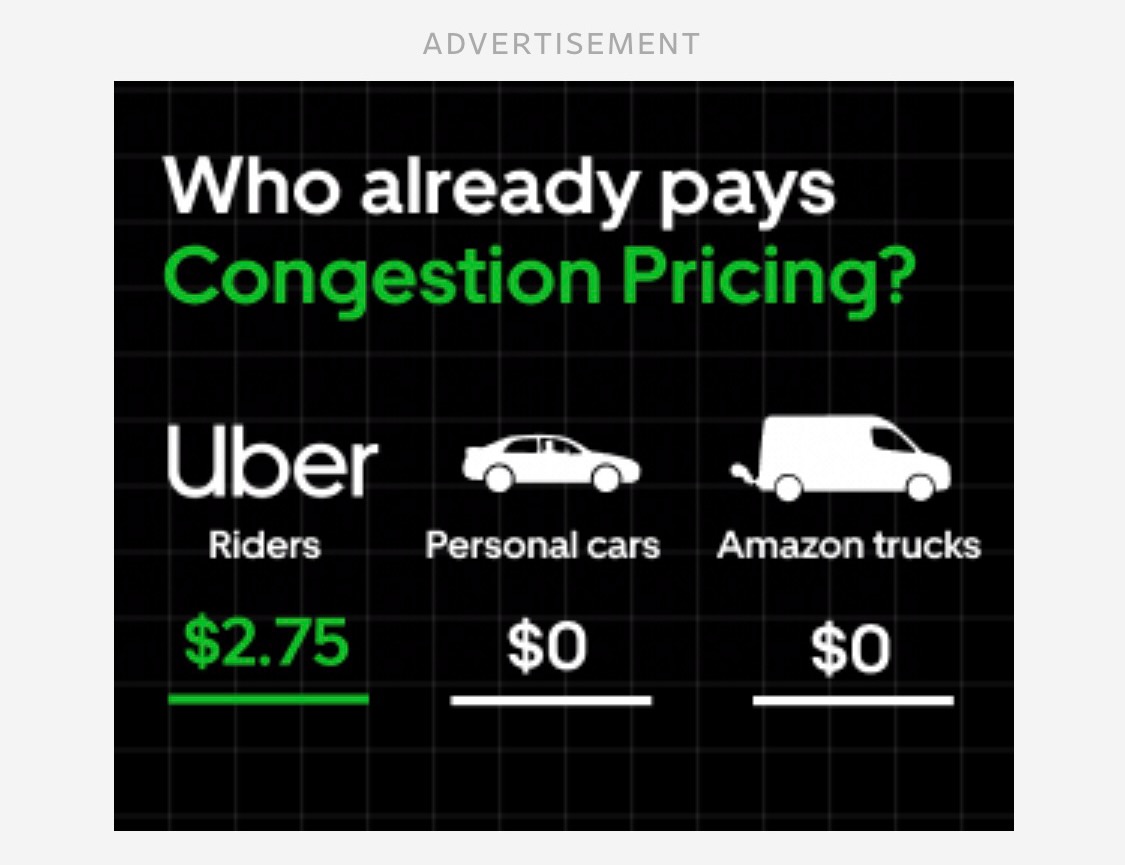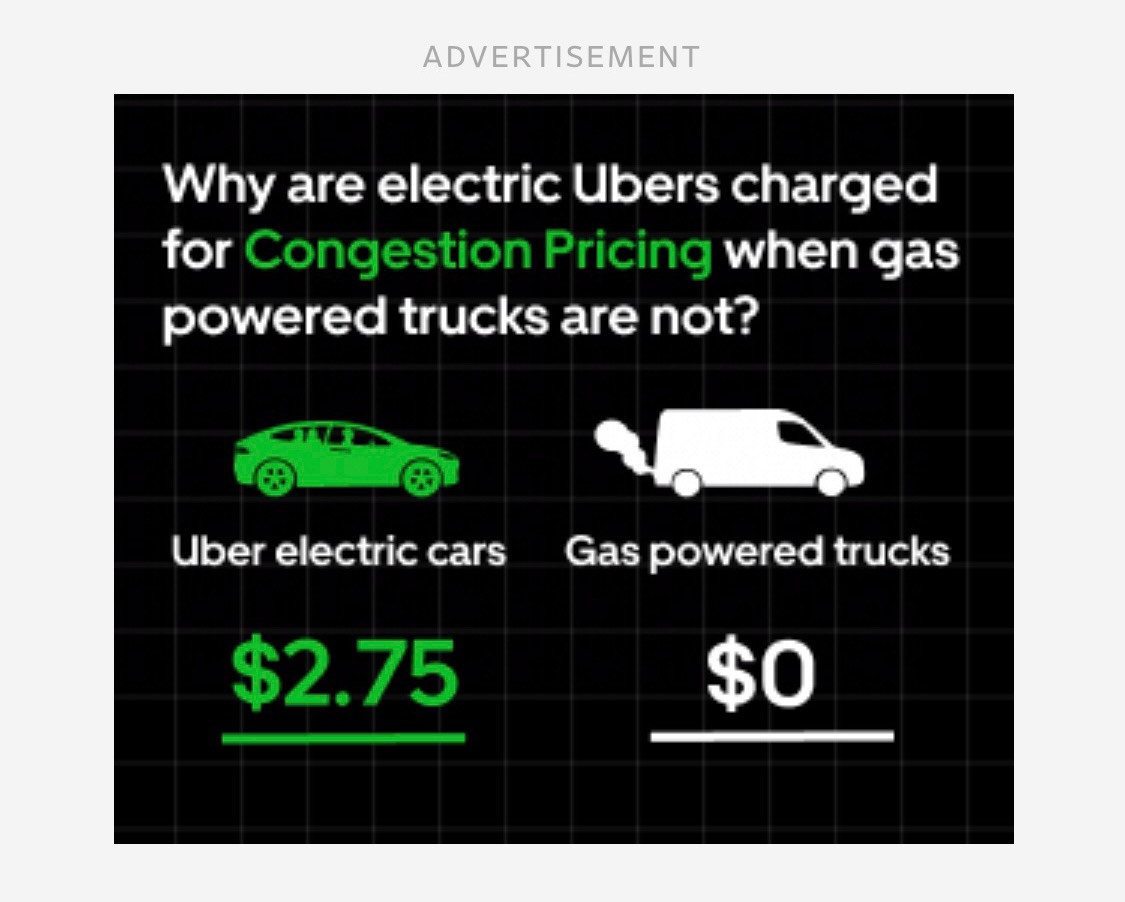Uber is running salty ads about New York City’s congestion pricing plan that suggest it is against congestion pricing despite the company’s official stance being for congestion pricing. The beef centers on a small per trip fee instituted in 2019. The ads themselves don’t explain any of this and sound anti-congestion pricing at a sensitive time for the long-delayed initiative that is set to begin next year.
One of the online ads asks “Why are electric Ubers charged for Congestion Pricing when gas powered trucks are not?” (Only about one percent of the city’s for-hire vehicle fleet is electric.) Below that is a graphic saying Uber electric cars are charged $2.75 and gas powered trucks are charged $0. Another ad asks “Who already pays Congestion Pricing?” The answer, according to the ad, is Uber riders, who pay $2.75, while personal cars and “Amazon trucks” are charged $0. Clicking the ads takes you to a landing page headlined “Uber Supports Congestion Pricing.”
Videos by VICE


These ads look and read like anti-congestion pricing ads, albeit confusing ones since the whole point of congestion pricing is to charge all those Amazon trucks and personal cars and everyone else more than $2.75—likely peak rates somewhere between $10 and $20, although the exact pricing and details have yet to be determined—to enter Manhattan below 60th Street. Yet, to anyone who might bother to click on the ads, they will be taken to a landing page on Uber’s website that says “Uber Supports Congestion Pricing.”
The $2.75 fee the ads refer to are the “congestion surcharge” that was passed in 2019 applying to any for-hire vehicle trip that begins or ends below 96th Street in Manhattan, the most valuable and congested street space in the country. For-hire vehicles like Ubers have been a significant contributor to, but are by no means the only, source of increased congestion in Manhattan over the last decade. The fee is paid by passengers, not drivers, and applies to taxis, cabs, limos, black cars, and Ubers and Lyfts.
In a statement to Motherboard, Uber spokesperson Josh Gold said, “The ad campaign is designed to remind people that the existing taxi and FHV charge is the only current congestion surcharge, sold as phase 1 of congestion pricing and Uber riders have already been paying $2.75, and will continue to pay that post implementation of the central business district tolling program.” In a follow-up email, Gold added that it is clear to anyone who clicks the ads that Uber supports congestion pricing.
The $2.75 fee has never been particularly controversial. It is the equivalent of a single subway fare and targets one of the most transit-rich areas in the world. For people whose rides either start or end in an area outside the zone poorly served by public transit, the fare will be dozens if not hundreds of dollars and the $2.75 per trip is negligible, a fee roughly equivalent to the extra time charge of hitting two extra red lights in a cab with a running meter. For people choosing to travel by hired vehicle when they could walk or take public transit instead, a $2.75 surcharge seems fair, probably even underpriced.
Uber has long advocated for congestion pricing in New York City and actually explains why pretty well on the landing page the ads go to. “Uber supports congestion pricing, including on our own trips, to fund mass transit infrastructure. We do this because we are a for-profit company and good, robust, public transportation is good for business, reducing the need for car ownership and increasing use cases for Uber. Congestion that slows travel times and frustrates riders and drivers is bad for business. In fact, our top cities are ones where robust public transportation options serve as the backbone of a daily commute.”
The landing page says Uber is mad because “Unlike personal vehicle owners, Amazon delivery trucks, or any other vehicle on the road—taxis and FHV have, and will continue, to have to pay the existing per trip congestion toll to the MTA.”
Last month, the Federal Highway Administration gave near-final approval to the congestion pricing plan, making it likely the tolling will begin sometime in mid-2024, barring any late developments from the inevitable lawsuits from a small number of angry New Jersey drivers. Essentially, Uber seems to want the $2.75 per-trip fee to go away once congestion pricing is implemented. That’s a reasonable enough policy debate to have, if a bit in the congestion pricing weeds, since it’s a debate about the value of per-trip fees when there is also a per-day charge. But it’s a bizarre issue on which to run ads that sound anti-congestion pricing altogether, especially for a company that claims to be totally supportive of congestion pricing as a whole.




